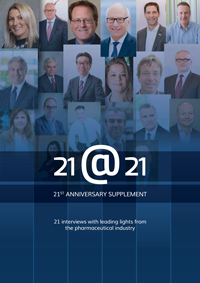Strong partnership environment heralds success in pharma
Posted: 12 January 2018 | Will Downie - Catalent | No comments yet
Catalent believes it is essential to share knowledge and experience to improve understanding of drug formulation and delivery challenges and contribute jointly to finding solutions. Will Downie, Senior Vice President, Global Sales and Marketing at Catalent, explains how his company makes a success of this strategy…
What would you say have been the most significant developments in the industry for contract manufacturing and development to the pharmaceutical market over the past 21 years?
The pharmaceutical marketplace continues to be very robust, and pipelines are once again growing. Five years ago, there were approximately 8,500 molecules in development pipelines – now there are about 12,000. And the biologics market is going from strength to strength – today, 40% of pipeline products are large-molecule and other biologic drugs. Clinical trial programmes now have an increasingly narrow and more focused indication for approval, followed by post-approval clinical trials to expand the drug’s indications. So, today, scaleup is seen more as a continuum than a singular event occurring at a late stage of the approval process. As patient-centric drug development and design becomes more prevalent, pharma companies are increasingly considering patient-friendly dosage forms earlier in the development phase. Catalent sees this as a smart strategy – when we’re engaged early, we can add more value, help avoid the cost of failure later in development, and ultimately help make better treatments.
[insert_php] if ( zmember_valid_subscription() ) { echo ‘
DOWNLOAD THE ENTIRE 21st ANNIVERSARY SUPPLEMENT NOW
‘ ; } else { echo ‘
DOWNLOAD 21 @ 21 SUPPLEMENT PDF – SUBSCRIBE FREE (OR LOGIN)


Not yet a subscriber? Join our growing community of thousands of industry professionals and gain access to:
- Bi-monthly issues in print and/or digital format
- Case studies, whitepapers, webinars and industry-leading content
- Breaking news and features
- Our extensive online archive of over 8,500 articles and past issues
- …and it’s all free!
‘; } [/insert_php]
How is your company preparing for these developments?
Catalent believes it is essential to share knowledge and experience – not only across the various sites and business units within the company, but also with outside organisations – to improve understanding of the current challenges of drug formulation and delivery and contribute jointly to finding solutions. Catalent’s Applied Drug Delivery Institute serves as a link to encourage collaboration between industry and academia. Earlier this year, for example, the institute entered a collaboration with the Department of Pharmacy Practice at Rutgers University aimed at identifying and addressing the specific challenges of paediatric formulation and drug delivery. Catalent has also recently strengthened its position as a leader in biologics development, analytical and finished product supply with the acquisition of biologicsfocused CDMO, Cook Pharmica. This deal adds a world-class, 875,000 square foot development and manufacturing facility and an additional 750 employees into the Catalent network. It expands our capabilities across biologics development, clinical and commercial cell culture manufacturing, formulation, finished-dose manufacturing and packaging. This acquisition complements Catalent’s expertise in cell-line engineering, bioconjugate development, analytical services, biomanufacturing, aseptic prefilled syringes, and blow-fill-seal technologies.
How has your company evolved to meet these challenges?
Over the last 10 years, CDMOs in general have more frequently demonstrated their development credentials, especially in their quality and regulatory expertise, knowledge of scale-up and network strategies, operational excellence, and, most notably perhaps, through innovation and provision of bespoke drug delivery technologies. Catalent’s strategy is to work with molecules early in development, then help our customers to overcome would-be developmental hurdles, such as bioavailability issues, or selection of the right dosage form. Keeping pace with these challenges means that Catalent is constantly investing and evolving, whether through acquisitions, such as Pharmatek Laboratories in 2016 and Cook Pharmica, or through organic growth. We spend 7-8% of our top line on capital investment, which represents more than $120m this last fiscal year alone. In this business, you cannot afford to stand still.
Looking ahead to the next few years, what do you think are likely to be the main opportunities and challenges affecting your industry?
Compounds in the pipeline are more frequently complex. Small-molecule compounds more often suffer from poor bioavailability or require other technical or clinical formulation solutions to meet clinical outcomes – such as targeted, or complex release profiles. Proteins and other biologics present different challenges, such as characterisation and consistent manufacturing. And there is always the desire to deliver large molecules non-invasively, for example as oral doses. On top of that, new treatment modalities, such as cell and gene therapy, require even more drug delivery innovation. As drug companies seek to better address the needs of patient groups, dosage forms and delivery systems play an increasingly important role in addressing the challenges faced by particular segments of the population. These include the elderly, the young, and patients for whom a simple loosely compressed tablet is just not adequate, especially when taking multiple doses, or multiple medicines.
What are your customers’ key requirements from their CMO or CDMO, and how are these changing?
CDMOs can play a very important role in increasing both the speed of development and preparation for commercial launch, as well as throughout a product’s life. So, for an outsourcing supplier to be able to offer integrated solutions from one site, and scale up from clinical to commercial at that same site, can be crucial in achieving accelerated development. It also minimises the need, cost, and risk associated with site transfer later in development, or even after commercialisation. At the end of a product’s life, an outsourced provider managing multiple programmes can often provide better resource utilisation, too. Furthermore, if the product requires an advanced technology for formulation or dosage form, a CDMO like Catalent that helps launch almost 200 new products a year is likely to have far deeper and broader experience in formulating, filing, and scaling up that technology. Over the last 10 years, the pharmaceutical services sector has come of age; companies have become much more credible partners by proving that our quality, reliability, operational excellence and ability to innovate are at least comparable to that of big pharma. We are seeing a strong partnership environment that didn’t exist a decade ago.
How can customers get the most from their CMO or CDMO?
To be successful, a partnership between a pharma company and a CDMO requires honesty, openness, effective team management and excellent communication. Technical expertise and efficient technical transfer protocols are crucial, but the most important factor will be the development of good working relationships at multiple levels. Most pharma companies are looking for greater freedom to vary cost proportionately with output, so price will therefore always be a factor in selecting a CDMO. But more important than price is the value that the CDMO delivers over the course of the programme’s lifecycle. The cheapest option rarely turns out to be the best value, which increases the risk of delays, quality issues and disruption to the supply chain when a product approaches commercialisation. The best outsourcing partner is not simply the one that meets all the technical requirements; there must also be a good cultural fit and a demonstrable track record that gives the originator confidence in all aspects of the partner’s abilities.
What would you say has been your company’s outstanding achievement(s) of recent years, and what impact has this had on your customers and potentially the industry more generally?
As a company that brings to market almost 200 new products a year, we have many points of pride, but innovative new technologies with direct patient benefit are among the most important. Within the past few years, that would include our partnership with Opko on Rayaldee, the first plant-based soft capsule product approved by the US FDA, and our development of Zydis Ultra, the next generation of our proprietary oral dissolving tablet. We are constantly investing in improvements for our customers and their patients, including through strategic acquisitions such as Cook Pharmica, Accucaps, and Pharmatek, and through hundreds of millions of dollars in investments in our existing facilities. Putting the patient first is at the heart of Catalent. Few diseases are adequately addressed by a ‘one-size-fits-all’ approach to dosing, dosage form and formulation – and this realisation must be combined with scientific expertise in pharmacokinetics, pharmacodynamics and pharmacogenomics. Without these factors, tailoring new drugs in a patient-centric manner must be hit or miss. A CDMO needs to possess these capabilities at all phases and be able to apply lessons learned during one stage to subsequent development and manufacturing stages. It must also manufacture its products with an uncompromising focus on quality and reliable supply.
COMPANY PROFILE
The Catalent brand is 10 years old, but our history and heritage goes back more than 80. The company is the leading global provider of advanced delivery technologies and development solutions for drugs, biologics and consumer health products. We employ over 10,000 people at more than 30 facilities across five continents. In our last fiscal year, ending June 2017, our turnover reached more than $2bn. We manufacture around 72 billion doses for patients and consumers in a year – this equates to roughly one in every 20 doses taken around the world.









